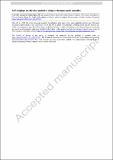Self-coupling: an effective method to mitigate thermoacoustic instability
Author(s)
Srikanth, Sneha; Sahay, Ankit; Pawar, Samadhan A.; Manoj, Krishna; Sujith, R. I.
Download11071_2022_7750_ReferencePDF.pdf (2.881Mb)
Publisher Policy
Publisher Policy
Article is made available in accordance with the publisher's policy and may be subject to US copyright law. Please refer to the publisher's site for terms of use.
Terms of use
Metadata
Show full item recordAbstract
Abstract
The presence of undesirable large-amplitude self-sustained oscillations in combustors resulting from thermoacoustic instability can lead to performance loss and structural damage to components of gas turbine and rocket engines. Traditional feedback controls to mitigate thermoacoustic instability possess electromechanical components, which are expensive to maintain regularly and unreliable in the harsh environments of combustors. In this study, we demonstrate the quenching of thermoacoustic instability through self-coupling—a method wherein a hollow tube is used to provide acoustic self-feedback to a thermoacoustic system. Through experiments and modeling, we identify the optimal coupling conditions for attaining amplitude death, i.e., complete suppression of thermoacoustic instabilities, in a horizontal Rijke tube. We examine the effect of both system and coupling parameters on the occurrence of amplitude death. We thereby show that the parametric regions of amplitude death occur when the coupling tube length is close to an odd multiple of the length of the Rijke tube. The optimal location to place the coupling tube for achieving amplitude death is near the antinode of the acoustic pressure standing wave in the Rijke tube. Furthermore, we find that self-coupling mitigates thermoacoustic instability in a Rijke tube more effectively than mutual coupling of two identical Rijke tubes. Thus, we believe that self-coupling can prove to be a simple, cost-effective solution for mitigating thermoacoustic instability in gas turbine and rocket combustors.
Date issued
2022-08-11Department
Massachusetts Institute of Technology. Department of Mechanical EngineeringPublisher
Springer Netherlands
Citation
Srikanth, Sneha, Sahay, Ankit, Pawar, Samadhan A., Manoj, Krishna and Sujith, R. I. 2022. "Self-coupling: an effective method to mitigate thermoacoustic instability."
Version: Author's final manuscript